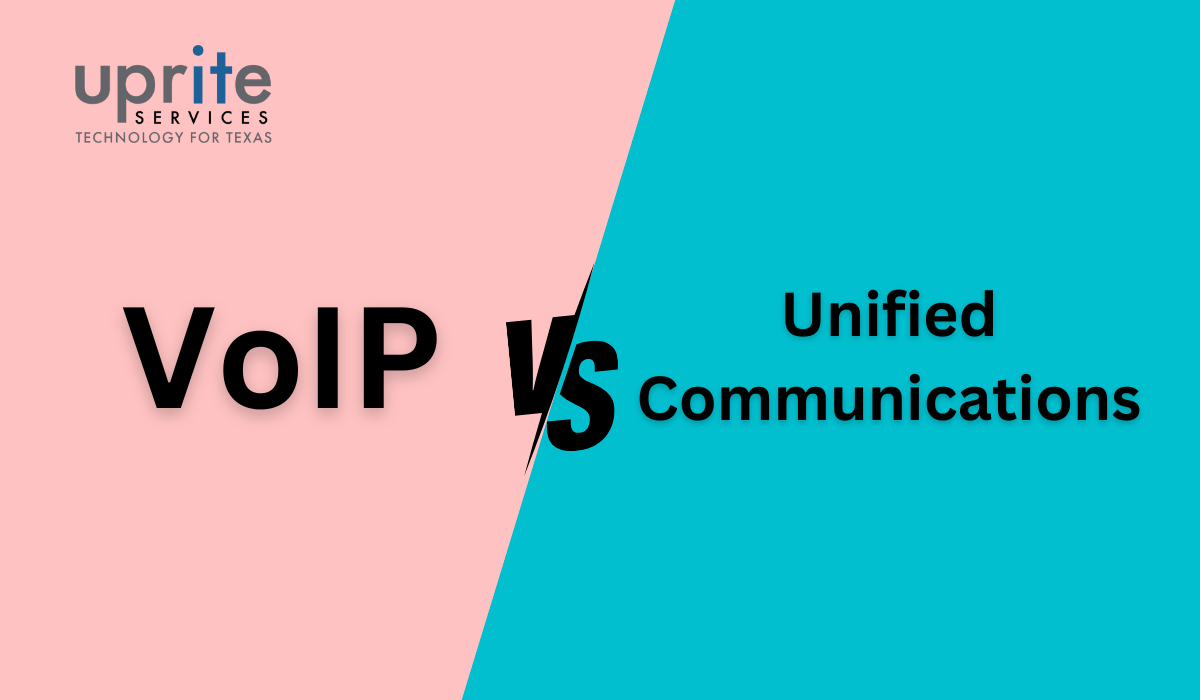
Communication is essential for any business to succeed in today’s competitive and dynamic market. With the advancement of technology, businesses have a variety of options to choose from when it comes to communication solutions. Two of the most popular and widely used solutions are Voice over Internet Protocol (VoIP) and Unified Communications as a Service (UCaaS). Both solutions offer significant benefits for businesses, such as cost savings, scalability, flexibility, and improved collaboration. However, they also have some differences that may affect your decision on which one is the best fit for your business needs, budget, and goals. In this article, we will compare VoIP and UCaaS to help you understand the differences and similarities between them and decide which one is right for your business.
Understanding VoIP
VoIP is a technology that allows you to make and receive voice calls using an internet connection instead of traditional phone lines. VoIP converts your voice signals into digital data packets, which are then transmitted over the internet. Here you can learn more about VoIP remote workers.

VoIP systems typically consist of the following components:
- IP Phones or Softphones: These are devices or applications that enable you to make and receive VoIP calls. An IP phone is similar to a regular desk phone, but it connects to the internet instead of a phone line. A softphone is a software-based phone application that you can install on your computer, smartphone, or tablet.
- VoIP Gateway: This is a device that converts analog voice signals from traditional phone lines into digital data packets that can be sent over the internet. This allows you to connect your VoIP system with the public switched telephone network (PSTN) and make calls to and from regular phone numbers.
- VoIP Service Provider: This is a company that provides you with the VoIP service and features, such as call routing, call forwarding, voicemail, caller ID, and more. You usually pay a monthly fee or a per-minute rate for the service, depending on your plan and usage.
Understanding Unified Communications (UC)
Unified Communications (UC) is a cloud-based platform that integrates various communication channels, such as voice, video, messaging, and collaboration tools, into a single, unified interface. UC solutions are delivered and managed by a third-party service provider, eliminating the need for businesses to maintain and manage their own communication infrastructure.

UC systems typically include the following features:
- Voice Calling: UC platforms offer various voice communication features, such as traditional phone calls, voicemail, call routing, and call forwarding, which are essential for businesses that rely on phone services to interact with customers, partners, and employees.
- Video Conferencing: Video conferencing is a crucial component of UC solutions, enabling face-to-face communication between remote participants. UC platforms often provide features like screen sharing, recording, and virtual whiteboards to enhance collaboration during video meetings.
- Instant Messaging and Presence: Instant messaging and presence features allow team members to communicate quickly, reducing the need for lengthy email exchanges or phone calls. Presence indicators show the availability status of coworkers for better collaboration and productivity.
Cost Comparison
One of the main factors that businesses consider when choosing a communication solution is the cost. Both VoIP and UC can help you save money on your communication expenses, but they have different pricing models and factors that affect their total cost.

VoIP costs are mainly determined by the following factors:
VoIP Service Provider
The VoIP service provider is the company that provides you with the VoIP service and features. The cost of the service depends on the provider, the plan, and the features that you choose. Some providers charge a monthly fee per user or extension, while others charge a per-minute rate for the calls. You may also have to pay extra fees for additional features, such as call recording, voicemail transcription, or toll-free numbers.
VoIP Hardware and Equipment
The VoIP hardware and equipment are the devices that you use to make and receive VoIP calls. The cost of the hardware depends on the type, quality, and quantity of the devices that you need. You may have to purchase IP phones, headsets, routers, switches, or adapters, depending on your VoIP system and setup. Alternatively, you can use your existing devices, such as your computer, smartphone, or tablet, and install softphone applications on them.
Internet Connection
The internet connection is the medium that enables your VoIP system to function. The cost of the internet connection depends on the speed, bandwidth, and reliability of the service that you have. You may have to upgrade your internet service or install a dedicated internet line for your VoIP system to ensure optimal performance and quality.
UC costs are mainly determined by the following factors
UC Service Provider
The UC service provider is the company that provides you with the UC platform and features. The cost of the service depends on the provider, the plan, and the features that you choose. Most providers charge a monthly fee per user or seat, which includes access to all the communication channels and tools that the platform offers. You may also have to pay extra fees for additional features, such as contact center, analytics, or security.
UC Hardware and Equipment
The UC hardware and equipment are the devices that you use to access and use the UC platform. The cost of the hardware depends on the type, quality, and quantity of the devices that you need. You may have to purchase webcams, microphones, speakers, or monitors, depending on your UC system and setup. Alternatively, you can use your existing devices, such as your computer, smartphone, or tablet, and install UC applications on them.
Internet Connection
The internet connection is the medium that enables your UC platform to function. The cost of the internet connection depends on the speed, bandwidth, and reliability of the service that you have. You may have to upgrade your internet service or install a dedicated internet line for your UC platform to ensure optimal performance and quality.
The exact cost of VoIP and UC for your business will vary depending on your specific needs, preferences, and usage. However, in general, UC tends to be more expensive than VoIP, as it offers more features and functionality.
Decision-Making Factors
Besides cost, there are other factors that you should consider when deciding between VoIP and UC for your business. These factors include:

Communication Needs
You should assess your communication needs and goals, and determine which solution can best meet them. For example, if you only need basic voice communication features, such as making and receiving calls, VoIP may be sufficient for you. However, if you need more advanced and diverse communication features, such as video conferencing, instant messaging, and collaboration tools, UC may be a better option for you.
Business Size and Structure
You should consider your business size and structure, and how they affect your communication requirements and challenges. For example, if you have a small or medium-sized business with a simple and centralized structure, VoIP may be enough to handle your communication needs. However, if you have a large or complex business with multiple locations, departments, and teams, UC may be more suitable to facilitate your communication and coordination across your organization.
Business Growth and Scalability
You should consider your business growth and scalability, and how they impact your communication capacity and demand. For example, if you have a stable or slow-growing business with predictable communication needs, VoIP may be able to accommodate your growth and expansion. However, if you have a fast-growing or dynamic business with changing communication needs, UC may be more flexible and scalable to adapt to your growth and demand.
Business Security and Reliability
You should consider your business security and reliability, and how they influence your communication quality and continuity. For example, if you have a low-risk or non-critical business with minimal security and reliability concerns, VoIP may be adequate to provide your communication service. However, if you have a high-risk or critical business with strict security and reliability standards, UC may be more secure and reliable to protect your communication data and ensure your communication availability.
Case Studies and Examples
To illustrate the differences and benefits of VoIP and UC for different types of businesses, here are some case studies and examples of how businesses have used these solutions to improve their communication and achieve their goals.

VoIP Case Study
A small accounting firm that provides tax and financial services to local clients used VoIP to reduce their communication costs and improve their customer service. The firm switched from their traditional phone system to a VoIP service provider that offered them a flat monthly fee per user, which included unlimited local and long-distance calls, voicemail, caller ID, and call forwarding. The firm also purchased IP phones and headsets for their staff, and used their existing internet connection to make and receive VoIP calls. By using VoIP, the firm was able to save money on their phone bills, hardware, and maintenance, as well as provide faster and more efficient service to their clients.
UC Case Study
A large manufacturing company that produces and distributes automotive parts to global customers used UC to enhance their collaboration and productivity. The company adopted a UC platform that integrated various communication channels and tools, such as voice, video, messaging, and collaboration tools, into a single, unified interface. The company also purchased webcams, microphones, speakers, and monitors for their staff, and used their dedicated internet line to access and use the UC platform. By using UC, the company was able to improve their communication and coordination across their multiple locations, departments, and teams, as well as increase their efficiency and innovation.
Conclusion
Communication is vital for any business to succeed in today’s competitive and dynamic market. Two of the most popular and widely used solutions are VoIP and UC. Both solutions offer significant benefits for businesses, such as cost savings, scalability, flexibility, and improved collaboration. If you are interested in learning more about VoIP and UC, or if you are looking for a reliable and professional communication service provider that can help you implement and manage your communication solution, we invite you to contact us at Uprite IT Services. They are a leading IT service provider that specializes in providing VoIP and UC solutions to businesses of all sizes and industries.

